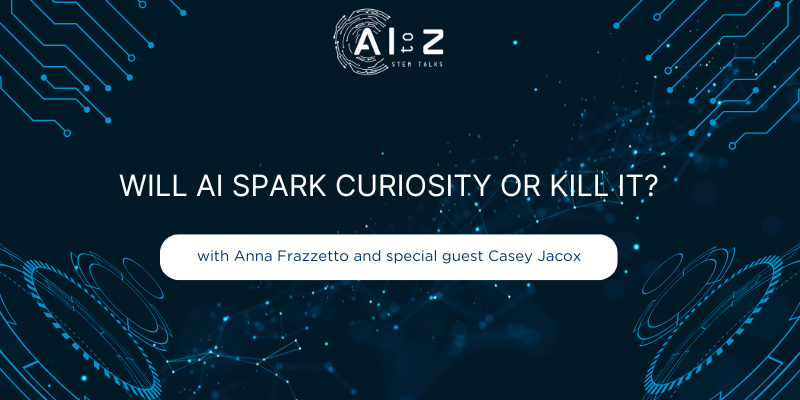
By
Matthew Hearfield
December 19, 2024
Updated
December 19, 2024
In this episode of the AI to Z Podcast, host Anna Frazzetto interviews Casey Jacox, a sales and leadership coach, to discuss the impact of AI on sales and leadership. They explore the balance between leveraging technology and maintaining essential skills like curiosity, humility, and preparation.

This conversation examines the risks of relying on AI as a shortcut and offers insights into how to maintain effective sales techniques in a technology-driven environment.
Listen to the full episode below:
The role of curiosity in sales success
Curiosity really shapes a sales individual, a sales leader, and a sales manager. If you’re not curious about your clients or their needs, you’re missing the key ingredient to connecting and succeeding in sales.
Curiosity is described as the cornerstone of effective salesmanship, leadership, and relationship-building. Casey emphasises that curiosity allows sales professionals to go beyond surface-level conversations, enabling them to ask thoughtful questions and understand their clients’ true needs. This skill not only improves client relationships but also fosters innovation and creativity in problem-solving.
AI as a double-edged sword
AI can ignite curiosity, but it can also create complacency. If we don’t back up what we’re learning from AI with real-world experience and effort, then we’re not doing the work, and our customers deserve better.
Casey highlights the dual nature of AI in sales and leadership. On one hand, AI offers tools that can help streamline research, provide insights, and increase efficiency. On the other hand, there’s a danger of over-reliance, which can lead to complacency and a loss of critical thinking skills. Casey stresses the importance of using AI as a complement to, not a replacement for, human effort and expertise.
Fear of AI in education & professional development
AI is like working with a partner on a project—it can help trigger ideas and provide structure, but both parties need to do the work. The challenge is ensuring it’s used to enhance thinking, not do the work for you.
Casey addresses common fears about AI in learning environments and professional growth. He acknowledges that educators and professionals may worry AI could lead to shortcuts, hindering the development of critical thinking and original work. However, he suggests that AI, when used correctly, can serve as a tool to spark ideas and augment learning, rather than replace genuine effort.
Balancing innovation
and responsibility
Humility and vulnerability are superpowers in relationship building. When we let people see our authentic selves, that’s when true connection happens.
Casey underscores the importance of vulnerability as a cornerstone for authentic relationship-building. In both professional and personal contexts, being open about challenges or imperfections fosters trust and deeper connections. Vulnerability also inspires others to engage genuinely, creating a foundation for collaboration and mutual respect.
Consistency across roles
Humility and vulnerability are superpowers in relationship building. When we let people see our authentic selves, that’s when true connection happens.
Casey advocates for maintaining a unified persona across personal and professional roles, emphasizing the value of authenticity. By rejecting the notion of having separate "work" and "personal" versions of oneself, individuals can build trust and authenticity in all interactions. This approach helps leaders and sales professionals foster genuine, lasting relationships.
Key takeaways
- The role of curiosity in sales success: Curiosity is positioned as a fundamental skill for sales professionals, shaping how they interact with prospects and clients.
- AI as a double-edged sword: Casey discusses how AI tools can streamline processes like research and data gathering, but warns against using AI as a crutch.
- The fear of AI in education and professional development: Casey shares his perspective on how educators and professionals view AI with scepticism, fearing it might undermine critical thinking and original work.
- Building relationships through vulnerability: Casey shares insights on how being open and vulnerable can strengthen professional and personal relationships.
- Consistency across roles: Casey advocates for a unified persona across personal and professional spheres, rejecting the notion of wearing different "masks" in various contexts.
Article and quotes have been edited for brevity and clarity.
